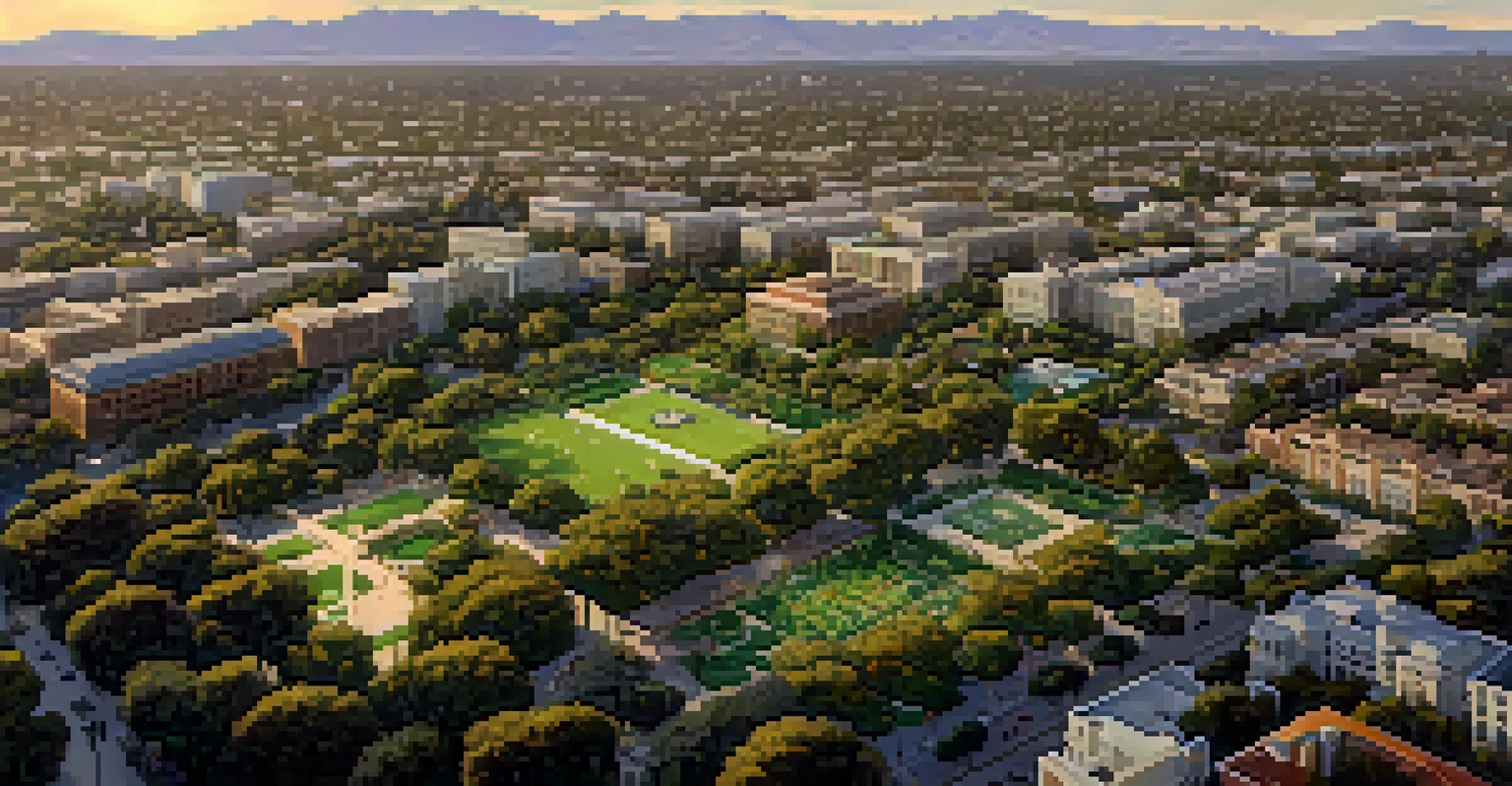Pasadena's Climate Action Plan: Strategies for a Greener Future

Understanding Pasadena's Climate Action Plan Goals
Pasadena's Climate Action Plan aims to address the pressing issue of climate change by focusing on sustainability and resilience. The plan outlines specific goals to reduce greenhouse gas emissions and improve the overall quality of life for residents. By setting clear targets, Pasadena is committed to creating a greener, healthier community for future generations.
The climate crisis is not a political issue, it is a moral and spiritual challenge to all of humanity. It is also our greatest opportunity to lift global consciousness to a higher level.
One of the key components of the plan is the commitment to achieve carbon neutrality by 2030. This ambitious goal reflects the city’s recognition of the urgent need to combat climate change and its impacts on local ecosystems and public health. The plan not only benefits the environment but also encourages economic growth through green jobs and sustainable practices.
Moreover, Pasadena's Climate Action Plan aims to engage the community in its initiatives. By fostering participation and collaboration among residents, businesses, and local organizations, the city hopes to create a shared vision for a sustainable future. This collective effort is crucial in driving meaningful change and ensuring that all voices are heard in the climate conversation.
Promoting Renewable Energy Sources in Pasadena
A significant focus of Pasadena's Climate Action Plan is the promotion of renewable energy sources, such as solar and wind. By increasing the use of clean energy, the city aims to reduce its reliance on fossil fuels and lower emissions. This shift not only helps the environment but also provides residents with the opportunity to save on energy costs in the long run.

Pasadena has implemented various incentives for homeowners and businesses to adopt solar energy, including rebates and streamlined permitting processes. These initiatives make it easier and more affordable for residents to install solar panels and contribute to the city’s renewable energy goals. As solar energy becomes more accessible, it paves the way for a more sustainable community.
Carbon Neutrality by 2030
Pasadena is committed to achieving carbon neutrality by 2030, addressing climate change while promoting economic growth through sustainable practices.
Additionally, the city is exploring partnerships with energy providers to expand its renewable energy portfolio. By collaborating with organizations focused on clean energy innovations, Pasadena can enhance its infrastructure and ensure a reliable supply of green energy. This proactive approach not only benefits the environment but also positions Pasadena as a leader in the transition to sustainable energy.
Enhancing Public Transportation for Sustainability
To further its climate goals, Pasadena is enhancing its public transportation system. With a focus on reducing traffic congestion and lowering emissions, the city is investing in more efficient transit options. This not only encourages residents to use public transportation but also promotes a shift towards more sustainable commuting habits.
We won't have a society if we destroy the environment.
The Climate Action Plan includes initiatives to expand bike lanes and pedestrian pathways, making it easier for residents to choose eco-friendly transportation. By creating a more walkable and bike-friendly city, Pasadena aims to reduce its carbon footprint while promoting healthier lifestyles. These improvements contribute to a vibrant, connected community that prioritizes sustainability.
Moreover, the city is exploring the integration of electric buses and other clean transit technologies. By modernizing its fleet, Pasadena can significantly cut down on emissions associated with public transit. This commitment to green transportation options aligns with the city’s broader climate objectives and sets an example for others to follow.
Implementing Energy Efficiency in Buildings
Pasadena's Climate Action Plan emphasizes the importance of energy efficiency in buildings as a key strategy for reducing greenhouse gas emissions. By retrofitting existing structures and incorporating energy-efficient designs in new constructions, the city aims to minimize energy consumption. This not only benefits the environment but also leads to cost savings for residents and businesses alike.
The city has introduced programs that provide financial incentives for building owners to improve energy efficiency. These incentives can cover various upgrades, such as better insulation, energy-efficient appliances, and smart home technologies. By making these improvements, Pasadena residents can enjoy lower utility bills while contributing to the city’s sustainability goals.
Renewable Energy Initiatives
The city promotes renewable energy sources, such as solar and wind, to reduce reliance on fossil fuels and lower emissions for a sustainable future.
In addition to individual efforts, Pasadena is also looking to establish energy efficiency standards for all new developments. By setting these guidelines, the city ensures that future construction aligns with its climate objectives. This forward-thinking approach not only enhances the quality of life for residents but also promotes a culture of sustainability throughout the community.
Community Engagement and Education Initiatives
Engaging the community is a cornerstone of Pasadena's Climate Action Plan. The city recognizes that fostering awareness and education about climate issues is essential for driving change. Through workshops, events, and educational programs, Pasadena aims to empower residents to take action in their own lives.
One effective strategy has been the implementation of community outreach programs that focus on practical steps individuals can take to reduce their carbon footprint. Topics such as waste reduction, energy conservation, and sustainable transportation options are covered, making it easier for residents to incorporate eco-friendly practices into their daily routines. This grassroots approach helps build a culture of sustainability within the community.
Additionally, Pasadena encourages residents to participate in local decision-making processes related to climate initiatives. By inviting feedback and suggestions, the city ensures that the voices of all community members are heard. This collaborative spirit not only strengthens community bonds but also fosters a sense of ownership in the fight against climate change.
Fostering Green Spaces and Urban Biodiversity
Pasadena's Climate Action Plan includes a commitment to enhancing green spaces and promoting urban biodiversity. Parks, gardens, and natural habitats play a crucial role in combating climate change by absorbing carbon dioxide and providing essential ecosystem services. By prioritizing these areas, the city not only improves air quality but also enhances the overall well-being of its residents.
The plan encourages the creation of community gardens and green roofs, which can serve as both food sources and habitats for wildlife. These initiatives not only beautify the city but also foster a connection between residents and nature. Engaging in gardening and environmental stewardship can inspire a sense of responsibility toward protecting the planet.
Community Engagement Matters
Community involvement is crucial for Pasadena's Climate Action Plan, as it fosters awareness and encourages residents to adopt eco-friendly practices.
Furthermore, Pasadena is exploring strategies to restore and preserve local ecosystems, such as wetlands and native plant habitats. By investing in these natural areas, the city can enhance biodiversity and resilience against climate impacts. This holistic approach to urban planning reflects Pasadena's commitment to a sustainable future for all.
Measuring Progress and Future Goals
A critical aspect of Pasadena's Climate Action Plan is the commitment to measuring progress and adjusting strategies as needed. The city recognizes that transparency and accountability are vital for building trust with the community. Regular reporting on emissions reductions and other sustainability metrics helps keep everyone informed about the impact of their efforts.
As part of this commitment, Pasadena is developing a framework for monitoring and evaluating the effectiveness of its climate initiatives. This data-driven approach allows the city to identify areas of success and those needing improvement. By staying flexible and responsive, Pasadena can adapt its strategies to meet evolving challenges in the fight against climate change.

Looking ahead, Pasadena aims to set even more ambitious goals beyond its initial targets. By continually raising the bar, the city hopes to inspire other communities to take similar action. This forward-thinking mindset not only reinforces Pasadena's leadership in sustainability but also contributes to a collective effort to address the global climate crisis.